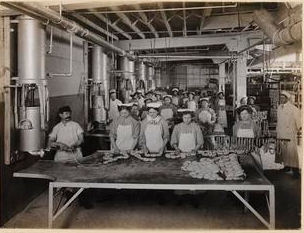![]()
The Industrial Revolution transformed life for many 19th-century Americans. Factories brought jobs, urban living, and a new relationship with food. City-dwellers became increasingly removed from the source of their food, leaving them more vulnerable to mishandled and adulterated products. Refrigerated railcars increased the distance food traveled and introduced more opportunities for food to be contaminated or doctored with chemicals. The growing array of convenience foods like ketchup and canned meats also introduced dangers into the household. Investigators from the Bureau of Chemistry–predecessor to the Food and Drug Administration–examined foods that endangered the health and lives of Americans in the mid to late 1800s.
Records from that period reveal tragedies, horrors, and the consequent public outcry for Federal regulation to protect people from dangerous and deceptive additives in food. By passing the Pure Food and Drug Act and Meat Inspection Act in 1906, the Government had accepted a new role: protecting consumers. Regulators for the new Food and Drug Administration were on a mission to protect American consumers from spoiled, rotten, poisoned, and adulterated foods.
Records in the National Archives tell compelling stories about the food revolution that coincided with the Industrial Revolution, the calls for and against government regulation of the food industry, and the increasingly technological methods of food processing.
